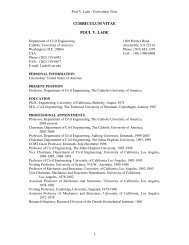FRITZ HABER, The Chemist of Life and Death There is probably no ...
FRITZ HABER, The Chemist of Life and Death There is probably no ...
FRITZ HABER, The Chemist of Life and Death There is probably no ...
Create successful ePaper yourself
Turn your PDF publications into a flip-book with our unique Google optimized e-Paper software.
<strong>FRITZ</strong> <strong>HABER</strong>,<br />
<strong>The</strong> <strong>Chem<strong>is</strong>t</strong> <strong>of</strong> <strong>Life</strong> <strong>and</strong> <strong>Death</strong><br />
<strong>The</strong>re <strong>is</strong> <strong>probably</strong> <strong>no</strong> other scient<strong>is</strong>t in h<strong>is</strong>tory who <strong>is</strong> celebrated <strong>and</strong> at the same<br />
time vilified for h<strong>is</strong> scientific work. H<strong>is</strong> d<strong>is</strong>covery <strong>of</strong> the catalytic process to generate<br />
ammonia from hydrogen <strong>and</strong> nitrogen, the Haber-Bosch process, simplified the<br />
production <strong>of</strong> fertilizer <strong>and</strong> has saved millions from starvation. It has been said that<br />
almost half <strong>of</strong> the earth’s population can credit him with their ex<strong>is</strong>tence. He was<br />
the recipient <strong>of</strong> the 1918 Nobel Prize in <strong>Chem<strong>is</strong>t</strong>ry for that work. And yet, as a dedicated<br />
German patriot during the First World War, he was the mastermind behind the development<br />
<strong>and</strong> implementation <strong>of</strong> po<strong>is</strong>on gases by the German military <strong>and</strong> thus <strong>is</strong> considered the father<br />
<strong>of</strong> modern chemical warfare. Partially as a result <strong>of</strong> her relegation to a subservient role as a<br />
housewife as well as h<strong>is</strong> military activities <strong>and</strong> in particular, h<strong>is</strong> use <strong>of</strong> chemical weapons, h<strong>is</strong><br />
wife Clara, a Ph.D. chem<strong>is</strong>t herself, committed suicide in 1915. <strong>The</strong> day after her death, he<br />
returned to h<strong>is</strong> military duties <strong>and</strong> organized a gas attack against the Russians.<br />
Haber was a Jew who had converted to Chr<strong>is</strong>tianity to assimilate, but the r<strong>is</strong>e <strong>of</strong> the<br />
Nazi party <strong>and</strong> the election <strong>of</strong> Adolf Hitler in 1933, whose anti-Semit<strong>is</strong>m was rac<strong>is</strong>t rather than<br />
religious in nature, eventually led to h<strong>is</strong> resignation as director <strong>of</strong> the Ka<strong>is</strong>er Wilhelm Institute<br />
for Physical <strong>Chem<strong>is</strong>t</strong>ry <strong>and</strong> Electrochem<strong>is</strong>try (renamed the Fritz Haber Institute <strong>of</strong> the Max<br />
Planck Society in 1953) <strong>and</strong> emigration to Engl<strong>and</strong>.<br />
Perhaps the most ironic aspect <strong>of</strong> Haber’s work was h<strong>is</strong> involvement in the development<br />
<strong>of</strong> Zyklon A, a liquid pesticide containing methyl cyan<strong>of</strong>ormate that released hydrogen cyanide<br />
on contact with water. Further development <strong>of</strong> th<strong>is</strong> pesticide was Zyklon B, a combination <strong>of</strong><br />
hydrocyanic acid <strong>and</strong> diatomaceous earth that was used to kill millions <strong>of</strong> Jews in Auschwitz-<br />
Birkenau, undoubtedly including some <strong>of</strong> h<strong>is</strong> relatives.<br />
He was born on December 9, 1868 in Breslau, Germany. From 1886 until 1891 he<br />
studied chem<strong>is</strong>try at the University <strong>of</strong> Heidelberg, at the University <strong>of</strong> Berlin, <strong>and</strong> at the<br />
Technical School at Charlottenburg. After completing h<strong>is</strong> University studies, he voluntarily<br />
worked in h<strong>is</strong> father's chemical business becoming interested in chemical tech<strong>no</strong>logy <strong>and</strong> also<br />
worked at the Institute <strong>of</strong> Tech<strong>no</strong>logy at Zurich. He then finally decided to take up a scientific<br />
career <strong>and</strong> went for one <strong>and</strong> a half years to work with Ludwig K<strong>no</strong>rr at Jena, publ<strong>is</strong>hing with<br />
him a joint paper on diacetosuccinic ester. Still uncertain whether to devote himself to<br />
chem<strong>is</strong>try or physics, he was <strong>of</strong>fered in 1894 <strong>and</strong> accepted an ass<strong>is</strong>tantship at Karlsruhe<br />
Institute <strong>of</strong> Chemical Tech<strong>no</strong>logy where he was taught <strong>and</strong> did research. He was made an<br />
associate pr<strong>of</strong>essor in 1898. In 1911, he became the Director <strong>of</strong> the Institute for Physical <strong>and</strong><br />
Electrochem<strong>is</strong>try at Berlin-Dahlem. He went to Engl<strong>and</strong> in 1933,<br />
He was married to Clara Immerwahr <strong>and</strong> Charlotte Nathan, <strong>and</strong> they had three children,<br />
Eva, Herman, <strong>and</strong> Ludwig Fritz. He died in 1934 at the age <strong>of</strong> 65 from heart failure.
References:<br />
Fritz Haber: Jew<strong>is</strong>h chem<strong>is</strong>t whose work led to Zyklon B, by Chr<strong>is</strong> Bowlby, BBC Radio,<br />
http://www.bbc.co.uk/news/world-13015210 <strong>and</strong> the associated BBC broadcast, <strong>The</strong> <strong>Chem<strong>is</strong>t</strong><br />
<strong>of</strong> <strong>Life</strong> <strong>and</strong> <strong>Death</strong> (http://www.bbc.co.uk/programmes/b01062gy)<br />
Master Mind: <strong>The</strong> R<strong>is</strong>e <strong>and</strong> Fall <strong>of</strong> Fritz Haber, the Nobel Laureate Who Launched the Age <strong>of</strong><br />
Chemical Warfare, Daniel Charles, Harper Collins, NY, 2005 (Kindle edition, 2009)<br />
http://www.<strong>no</strong>belprize.org/<strong>no</strong>bel_prizes/chem<strong>is</strong>try/laureates/1918/haber.html<br />
© 2011, Michael Epstein <strong>and</strong> Leopold May

















